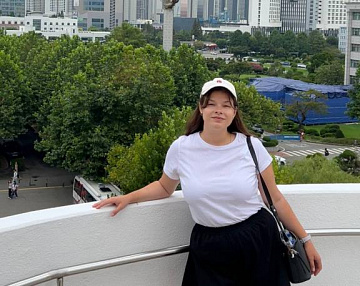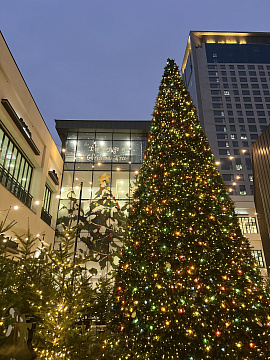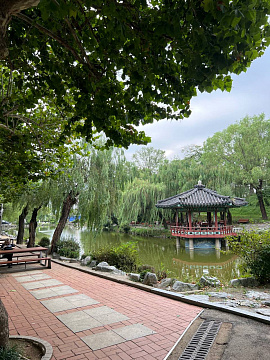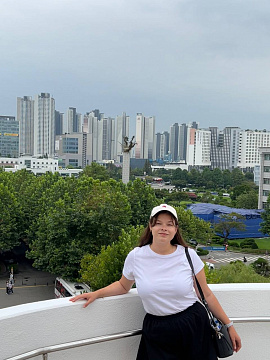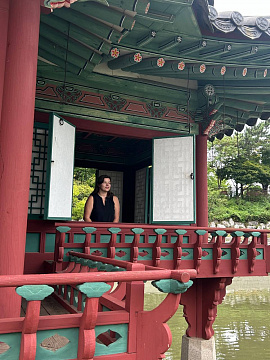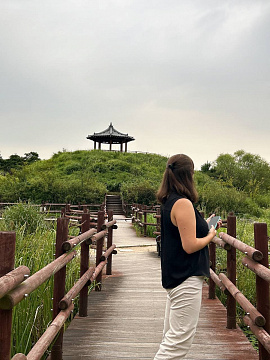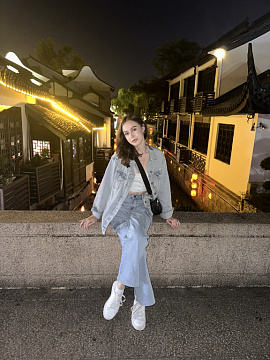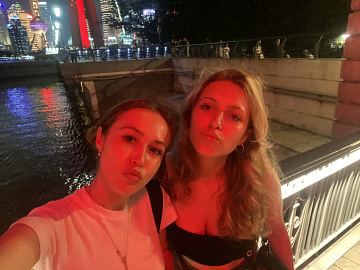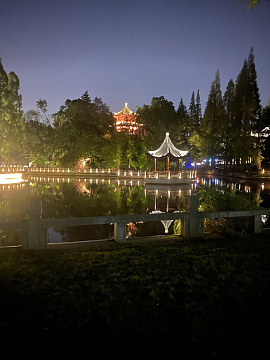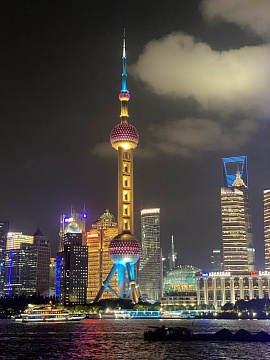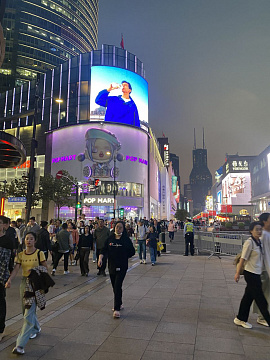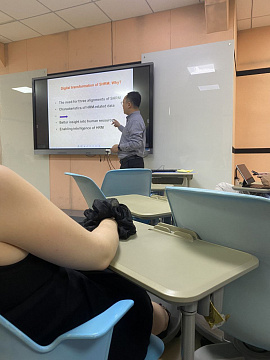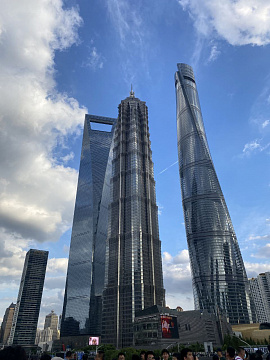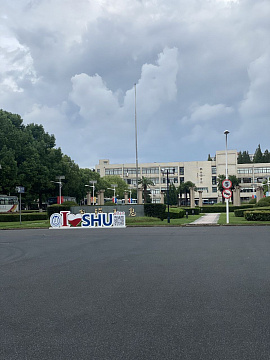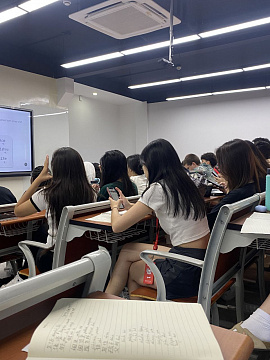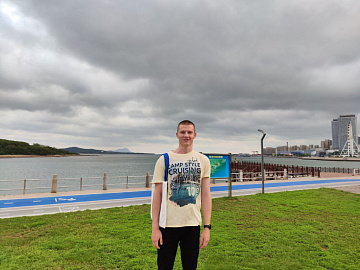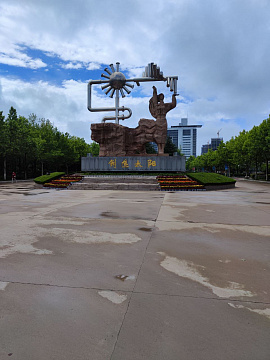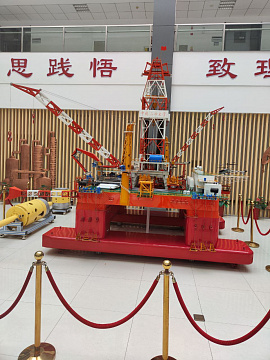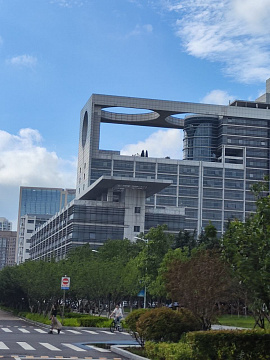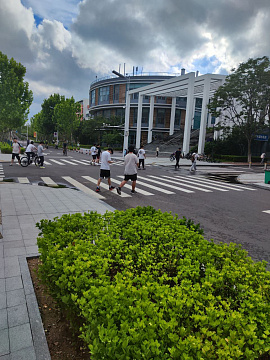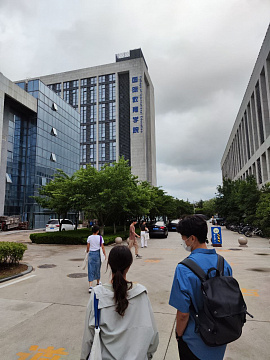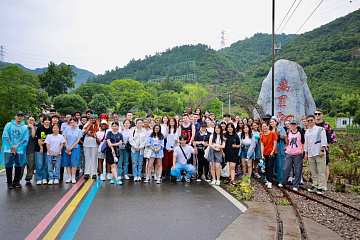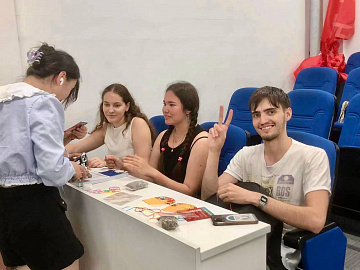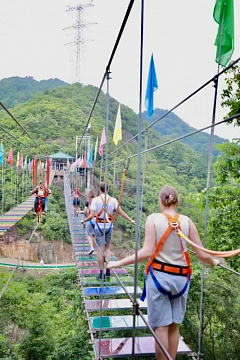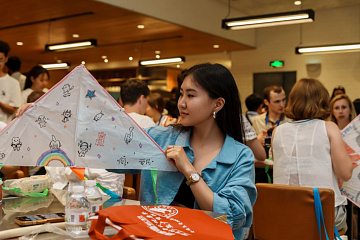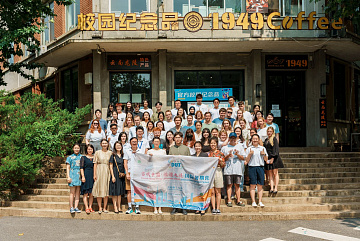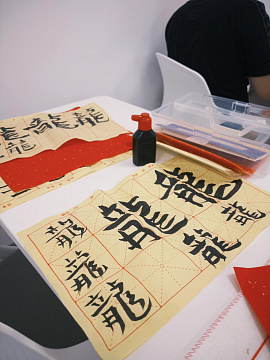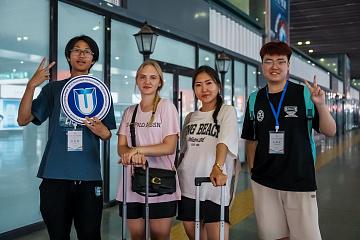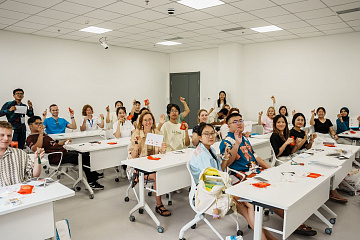
Studying in South Korea was a good experience of living in another country. I was able to get acquainted with the culture and peculiarities of the country, make friends from other countries. In terms of the curriculum, I was able to choose subjects that are interesting to study, try myself as an entrepreneur in one of the classes.
What difficulties did you have at the stages of preparation for the internship? What tips and recommendations can you give to future participants of the academic mobility program?
At the preparation stages, problems arose with the compilation of an individual study plan. The main advice is to start preparing documents in advance.
Describe the process of obtaining a visa. Your advice for future participants of the academic mobility program.
When I was getting my visa, I didn't receive emails with my visa application. But I was able to resolve this by calling the consulate. It was easy to collect the documents. I got my visa within two weeks.
What difficulties did you encounter upon arrival at the host foreign organization? Your advice to future participants of the academic mobility program.
Not everywhere in Korea accepts cash, Russian cards do not work, but to get a bank card of a Korean bank you need a foreigner's card (Alien Registration Card). If you get a foreigner's card through a university, it takes 3 months, directly through the migration center is faster, but when we wanted to apply directly, the nearest appointment was in December. The main advice is to take with you a sufficient amount of cash in foreign currency (rubles are not accepted).
Specify your expenses related to participation in an internship abroad (visa costs, cost of flight / travel to the place of internship, registration fees / taxes / deposits in the host organization, policy / medical services, if used, public transport, meals, accommodation. Your tips for cutting costs.
Visa - $80
Roundtrip tickets around 60,000 rubles
Medical insurance - 3,000 rubles
Alien Registration Card - 3,000 rubles
Meals depend on personal needs, but a meal in an establishment costs around 700 rubles, in a cafeteria 300 rubles, there is no kitchen in the hostel, so we ate mostly in establishments.
Accommodation around $800
Washing/drying in the dormitory 85 rubles

Studying in Shanghai has been a real challenge for me, which, nonetheless, opened doors to numerous exciting opportunities. Compared to Irkutsk, the educational process here turned out to be significantly more complex, but it was this diversity and intensity that made it truly captivating.
Each class was carefully thought out and organized: we immersed ourselves in working with various matrices and participated in projects where we created concepts for our own companies. These practical assignments not only developed our skills but also allowed us to apply theoretical knowledge in practice. We also actively analyzed current information about management and business both in China and on the international stage, which helped us better understand global trends and the specifics of the local market.
However, despite the interesting learning process, exams became a real challenge. They required a deep understanding of the material and the ability to quickly adapt to new tasks.
The internship in Shanghai was a true revelation for me. I not only gained valuable knowledge but also made many new acquaintances that I am sure will be beneficial for me in the future. Communicating with people from different corners of the world broadened my horizons and enriched my experience.
Overall, China did not disappoint me in terms of education. And Shanghai itself is a city that amazes with its beauty and energy. Even after three months, I couldn't fully explore all its corners. Every day in this amazing city was filled with new discoveries and impressions that will stay with me forever.
What difficulties did you have at the stages of preparation for the internship? What tips and recommendations can you give to future participants of the academic mobility program?
During the preparation stage for our trip, one of the biggest problems arose: just a week before our departure, we were denied accommodation in the dormitory. This was undoubtedly a real shock for us, as we urgently needed to find a solution. However, we were fortunate to have a student buddy who helped us rent a small apartment just ten minutes away from the university. This was an excellent way out of the situation and allowed us to focus on the upcoming academic process.
Additionally, another significant difficulty was obtaining a Chinese bank card. Unfortunately, we found out that you could only get a card if you had been living in China for more than three months, while our travel plan was limited to exactly three months. This made us realize how important it is to prepare all the necessary documents in advance and think through important details.
So, I have an important piece of advice for those planning a similar trip: always have a backup plan regarding accommodation. Make sure to arrange to open a Union Pay card in advance (but be sure that the bank you choose is not under sanctions). And of course, try to establish contact with the curators and administration of the Chinese university right away.
Describe the process of obtaining a visa. Your advice for future participants of the academic mobility program.
To successfully obtain a visa, prepare all the necessary documents: a foreign passport, tickets, a completed application form, an invitation from the Chinese university, and form DQ. It is also important to organize the documents in the correct order — this information can be easily found online.
Once all the documents are collected, you will need to pay the visa fee at the bank. And by the following week, you will be able to pick up your visa.
What difficulties did you encounter upon arrival at the host foreign organization? Your advice to future participants of the academic mobility program.
The first difficulty I encountered was the language barrier. In China, almost no one speaks English, which created certain challenges in everyday life. To overcome this obstacle, I actively used a translator on my smartphone, which significantly facilitated communication with locals and helped me better navigate the new environment.
Additionally, I noticed that access to major social networks without using a VPN is quite difficult. As a result, I tested several VPN services and can confidently recommend apps like VPNify, Leaf, VPN Buck, and Adguard VPN — all of them provide free services and do their job well.
For navigation around the city, I installed the Baidu Maps app in advance but found that Apple Maps also worked well and was more convenient for me to use. This greatly simplified my travels and helped me adapt more quickly to the new surroundings.
Regarding food, I faced certain difficulties. Eating fast food in China, such as Burger King, KFC, or McDonald's, turned out to be quite expensive, while European cuisine was even more costly. Unfortunately, traditional Chinese cuisine did not appeal to me. As a result, I decided to take matters into my own hands and started cooking for myself.
Tips for future program participants:
1. Language Barrier: Be sure to download a translator app on your phone in advance. This will greatly simplify communication with locals and help in everyday situations.
2. VPN: Install and test several VPN apps before your arrival. This will help you stay connected with family and friends through social networks.
3. Navigation: Don’t forget to install navigation apps. This will make it easier to get around the city and help you avoid wasting time.
4. Food: Be prepared for the local cuisine not meeting your expectations. Consider the option of cooking for yourself.
5. Openness to New Experiences: Try to be open to new tastes and traditions. Even if you don’t like the local food at first, you may find your favorite dishes over time.
6. Learn About the Culture in Advance: Familiarize yourself with local customs and traditions. This will help you better understand your surroundings and adapt to the new culture.
Specify your expenses related to participation in an internship abroad (visa costs, cost of flight / travel to the place of internship, registration fees / taxes / deposits in the host organization, policy / medical services, if used, public transport, meals, accommodation. Your tips for cutting costs.
Shanghai is undoubtedly one of the most dynamically developing megacities in the world and the financial capital of China. Therefore, it is quite obvious that expenses here are significantly higher than in Irkutsk. For example, the cost of a student visa was 2,500 rubles. The round-trip flight with a layover in Beijing was also not cheap: the journey cost 37,000 rubles.
Upon arriving in Shanghai, I had to think about health insurance, which I arranged for at the university. It cost 400 yuan, which is approximately 6,000 rubles. One of the most significant expenses was housing rental: I paid 2,900 yuan for the first month and made a deposit of 3,000 yuan. In total, this expense amounted to about 83,000 rubles. Additionally, I pre-paid for two more months of rent, which added another 5,800 yuan to the total costs, and utilities, including water and electricity, were around 700 yuan for three months, or about 10,000 rubles. However, my friend and I split the rent and utility bills in half, so living expenses were certainly cheaper than if I had lived alone. Of course, mobile communication and internet cost about 150 yuan for three months.
As for food, since I am not a big fan of Asian cuisine, I often cooked for myself. This definitely reduced my expenses compared to constantly eating out at cafes and restaurants. Groceries in Shanghai are slightly more expensive than in Irkutsk, but thanks to home cooking, I was able to control my budget.
An important aspect during my stay in Shanghai was transportation. Taxis in this city are indeed inexpensive, but it would be a significant oversight not to mention how convenient it is to use public transport: the metro and buses are very reasonably priced and provide excellent connectivity throughout the city.
Tips for reducing living expenses in Shanghai:
• Compare rental prices: Use online resources such as classified ads and specialized websites to find housing. You can find more favorable offers there.
• Cook for yourself: By buying groceries at local markets or supermarkets, you can significantly reduce food expenses by preparing delicious meals on your own.
• Use public transport: Save on taxis by using the metro and buses. This is not only budget-friendly but also allows you to get to know the city better.
• Look out for local deals: Often, stores or markets have promotions and sales. Don’t hesitate to ask about discounts!
• Health insurance: Consider obtaining insurance from your home country before your trip; this can save you money and time.

My trip to China for a summer school at the China University of Petroleum left me with pleasant impressions. I especially liked that people from different countries and ages participated in the program - this helped me improve my English and make new friends. The study program was interesting. I learned a lot about modern automobile technologies.
I especially remember the high-speed trains, skyscrapers, inexpensive food and the huge number of people on the streets - all this was new and unusual for me. The Chinese are very friendly, often showed interest, took pictures with me and invited me to spend time together.
I also remember the activities that the university organized for us - that helped me to know the country and its culture better.
1. What difficulties did you have at the stages of preparation for the internship? What tips and recommendations can you give to future participants of the academic mobility program?
There were no difficulties. The main thing is to start preparing in advance to buy plane tickets cheaper and on the day you need.
2. Describe the process of obtaining a visa. Your advice for future participants of the academic mobility program.
To get a visa, you need to prepare the documents and then give them to the consulate, then pick up your passport with the visa pasted into it in a week. I advise you to be patient when you stand in line at the consulate.
3. What difficulties did you encounter upon arrival at the host foreign organization? Your advice to future participants of the academic mobility program.
The event was well organized. If you have any questions, you could ask a volunteer at any time.
4. Specify your expenses related to participation in an internship abroad (visa costs, cost of flight / travel to the place of internship, registration fees / taxes / deposits in the host organization, policy / medical services, if used, public transport, meals, accommodation. Your tips for cutting costs.
Visa: 2,600 rubles
Flight (round trip): 24,000 rubles
Train from Beijing to Qingdao and back: 9,000 rubles
Accommodation and education: free
One visit to cafeteria: 10-12 yuan
Insurance (13 days): 2,500 rubles
Also consider the cost of entertainment, museums, purchase of things and clothes.

During the 5 weeks of language school, I improved my level of language proficiency. I really want to express my gratitude to the very training at the Chinese university. We were often introduced to the cultural aspects of the country. Every weekend we visited different places where we could feel the whole Chinese atmosphere. As for the personal plan, I liked the old town and the residents themselves, very good-natured and ready to help.
2. What difficulties did you have during the preparation stages for the internship? What tips and recommendations can you give to future participants of the academic mobility program?
There were enough difficulties, as is usually found in a foreign country.
I would like to warn future participants of summer programs that all students of Chinese universities go on vacation and with them the opportunity to work out in the gym and the choice of canteens is very limited.
Personally, this caused me great discomfort, I had to look for an alternative outside the university and the prices were much higher than in the canteens themselves. Another problem was the Internet outside the hostel, our supervisor said that we would not really need it.
However, if you are going to visit the sights of the city, and in general just take a walk with music, it is very necessary. My Chinese friends advised me to buy a portable Wi-Fi instead of a SIM card, it was one of the best tips. It is cheap, takes up little space and is easy to use. From the advice, I can say about the importance of communicating with the Chinese themselves, they are very open guys and can help. You can also take Alenka chocolate or Russian sweets with you, I often gave them as a sign of gratitude
3. Describe the visa application process. Your advice for future participants of the academic mobility program.
I got a visa quickly without any problems.
You need to register on the site and enter personal information. During the visit, it is necessary to prepare documents related to the university's invitation
- a partner . It is better to visit the consulate not in the morning, but at 10:00, there were fewer people. When the documents are submitted, you will be given a check, according to which you go to the bank and pay the fees. Exactly one week and the visa will be read
4. What difficulties did you have upon arrival at the host foreign organization? Your advice to future participants of the academic mobility program.
There were no problems. We were flying from Beijing, there are two airports inside the city, we exchanged tickets due to the cancellation of our flight and did not look at the departure airport. We had to take the subway from one airport to another, which is very expensive and time-consuming.The host organization sent us female
students to help us get there
5. Specify your expenses related to participation in an internship abroad (visa costs, cost of flight / travel to the place of internship, registration fees/ taxes/ deposits in the host organization, policy / medical services, if used, public transport, meals, accommodation. Your tips for cutting costs.
Visa -250 ; one-way tickets 33,000, back 33,000; tuition 8000*(104,000) ; insurance 3000 ; meals 3000 (you can buy food once a week in large supermarkets, it will be more profitable than on campus) ; travel in Beijing and Ningbo envy of the choice of transport (in my case, the bus, Aeroexpress, bus, taxi ) and the distance was about 800*; use the metro it will be much cheaper

The internship was top notch! The program was rich and diverse: I studied Chinese and took part in numerous events aimed at familiarizing myself with Chinese culture. Such trips provide an opportunity to practice languages and make new acquaintances, which will be very useful in the future!
What difficulties did you have at the stages of preparation for the internship? What tips and recommendations can you give to future participants of the academic mobility program?
Overall, there were no problems. The hardest part was submitting documents, but even here everything turned out to be not so difficult, since academic mobility is always ready to help, and if questions arise, the staff will suggest a solution.
Do not miss the opportunity to participate in various trips and internships. And do not be afraid, even if you go alone or think that you do not know the language well enough. It is not as difficult as it may seem, because the people around are kind and always ready to help. Dream, learn new things and travel!
Describr the process of obtaining a visa. Your advice for future participants of the academic mobility program.
First, you need to wait for an invitation from the university, after which you can start preparing documents for a visa. It is important to carefully check all the papers to avoid possible problems at the consulate. The consulate is often crowded, but the process is fairly quick. You need to submit documents, wait for a second call, give fingerprints if necessary, after which you will be given a receipt for payment. Pay attention to the announcements at the consulate, which indicate which pages of the application form you need to sign and in what order the documents should be laid out. The visa will cost 2,500 rubles plus a 50-ruble commission. When you go to pay for the visa at the bank, do not forget to take this amount in cash. After paying for the visa, you can pick it up exactly one week later.
Obtaining a visa may seem like a difficult step, but in fact it is quite a simple process, although it does require some effort. Do not put off applying for a visa for a long time, it is better to do it right after receiving the invitation, so that you can calmly buy plane tickets.
What difficulties did you encounter upon arrival at the host foreign organization? Your advice to future participants of the academic mobility program.
We had no problems when we arrived. We were warmly welcomed by student volunteers who walked us to campus and helped us throughout the entire time. So don't worry, universities usually take care of your settlement so that it goes smoothly.
Specify your expenses related to participation in an internship abroad (visa costs, cost of flight / travel to the place of internship, registration fees / taxes / deposits in the host organization, policy / medical services, if used, public transport, meals, accommodation. Your tips for cutting costs.
Visa: 2550 rubles
Flight to Beijing roundtrip: 21,320 rubles
Train from Beijing to Dalian roundtrip: 13,000 rubles
Bus: 1 yuan

